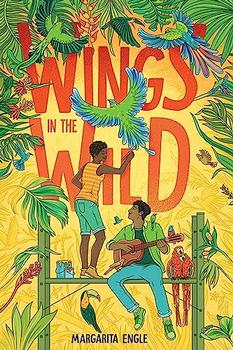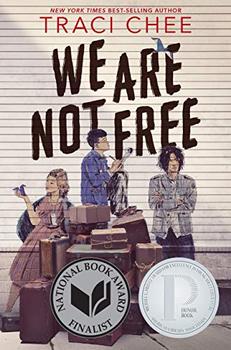Summary | Excerpt | Reviews | Beyond the book | Read-Alikes | Genres & Themes | Author Bio

Voted 2020 Best Young Adult Award Winner by BookBrowse Subscribers
Pulga and Chico are only dimly aware of the danger around them — the corruption, the drug dealing and the gang violence — as they grow up in a small town in Guatemala. But on the day their friend Pequeña has her baby, the three teenagers lose all semblance of innocence. The boys witness a murder, Pequeña wants nothing to do with the child of the man who holds her town hostage, and the friends realize that their lives depend on fleeing Puerto Barrios. Others from their village have made it to the United States on the back of the infamous train La Bestia; Pulga has been meticulously planning the trip north for as long as he can remember. And so, under cover of night, a teenage girl who gave birth days before, a gentle giant of a boy, and his best friend who feels the world too much, set off together on a journey many able-bodied men do not survive. Their story is told from two points of view — which is clear but heartbreaking foreshadowing.
The teens' harrowing trip north is full of chance encounters with the sorts of people who have made the plight of immigrants their business, some genuinely caring and helpful, others exploitative and opportunistic. Their ride through Mexico on La Bestia is depicted as a multisensory experience, sometimes nightmarish, sometimes triumphant. And the conclusion of that journey highlights the various ways a trip like this can end in these days of unaccompanied children waiting in cages on the border. The book avoids overtly politicizing the situation of these characters — an attorney volunteers to take their case, so they are safe from deportation, at least for a while — but it also makes clear that no sane person would repeatedly risk death in the desert or under the wheels of a train unless they had a desperate need to escape something terrible.
Pequeña, who disguises herself as a boy for her own safety, has a touch of second sight. Magical realism is not uncommon in books with Latinx characters, but it runs the risk of turning into a trope in the hands of a clumsy writer. Sanchez's hands are not clumsy; Pequeña believes in and trusts her visions, and they are described as vividly and beautifully as the horrors of La Bestia.
The ending of the journey is a bit too convenient to be fully believable, but it still feels right. And it is not a comfortable ending, though the most life-threatening moments may be behind these young people. It is also fitting that two characters who have frequently been called by somewhat juvenile, condescending nicknames finally come into their own, as if their ordeal has been a baptism.
Refugees have been traveling to what they hope will be a better life in the United States for generations, and the stream of undocumented immigrants continues. We Are Not from Here, with its young, sympathetic, genuinely desperate characters, is a heart-wrenchingly real novel to hand to any teen or adult who wonders how and why that journey can be so urgent and imperative for some.
![]() This review was originally published in The BookBrowse Review in July 2020, and has been updated for the
June 2021 edition.
Click here to go to this issue.
This review was originally published in The BookBrowse Review in July 2020, and has been updated for the
June 2021 edition.
Click here to go to this issue.

If you liked We Are Not from Here, try these:

by Margarita Engle
Published 2024
This gorgeously romantic contemporary novel-in-verse from award-winning author Margarita Engle tells the inspiring love story of two teens fighting for climate action and human rights.

by Traci Chee
Published 2022
"All around me, my friends are talking, joking, laughing. Outside is the camp, the barbed wire, the guard towers, the city, the country that hates us.
We are not free.
But we are not alone."
Your guide toexceptional books
BookBrowse seeks out and recommends the best in contemporary fiction and nonfiction—books that not only engage and entertain but also deepen our understanding of ourselves and the world around us.